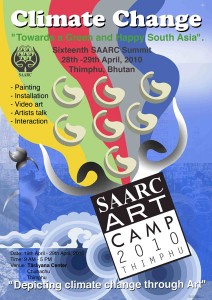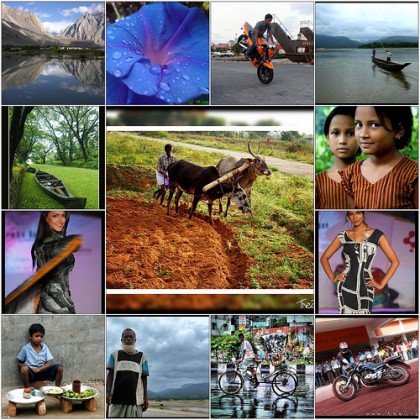Thimphu, the small capital of Bhutan is in a flurry of activity, [2]gearing up for the upcoming SAARC [3] (South Asian Association for Regional Cooperation) Summit which will take place at the end of April (28-29). This is the first time that Bhutan is hosting the Summit having passed the opportunity [4] three times in the past because of a lack of infrastructure.
However, the country is extremely proud that it will be hosting it this year, a year which coincides with the Silver Jubilee of the Regional Association. The SAARC, the most important regional alliance, was established when its Charter was adopted on December 8, 1985 and now have Afghanistan, Bangladesh, India, Maldives, Nepal, Pakistan and Sri Lanka as member nations. Bhutanese newspapers [2] report that 450 delegates from these countries and about 150 journalists are expected to attend and cover the summit and international observers from China, Japan, the European Union, Republic of Korea, USA, Australia, Mauritius and Iran will also attend.
Firoz at The South Asia blog informs [5]:
The official website [6] of the Sixteenth SAARC Summit has been created to share information related to the Summit and to facilitate various logistical arrangements.
Leaders of eight South Asian nations will gather in the Bhutanese capital of Thimphu and chart out a roadmap for conserving environment to face the climate change, poverty alleviation, promoting cooperation in hardcore economic areas and curbing terrorism.
 [7]The Maldivian blog Maldives Live [8] quoted [9] Bangladesh Foreign Secretary Mijarul Quayes as saying that Bangladesh and the Maldives are two countries most vulnerable to changing climate.
[7]The Maldivian blog Maldives Live [8] quoted [9] Bangladesh Foreign Secretary Mijarul Quayes as saying that Bangladesh and the Maldives are two countries most vulnerable to changing climate.
Quoting environment scientists, he said the Maldives will lose its existence with the rise of sea level while Bangladesh will lose 20 percent of its low lying areas in the Bay, which will displace 25 million people.
He said SAARC council of ministers meeting in Thimpu will finalize a declaration on the climate change.
Besides, the summit is expected to sign agreement on trade and services, rapid response to natural disaster and cooperation in environment and South Asian Development Fund.
It is also being speculated that Prime Minister, Dr. Manmohan Singh, and his Pakistani counterpart, Yousuf Raza Gilani, may take this opportunity to meet on the side to talk in detail about counter-terrorism in the two countries, even though the Hindustan Times [10] has informed that the two leaders will not be meeting.
Blogger Ani at Taragana [11] said:
If the leaders meet, it would be their first meeting since the dialogue in Sharm-el-Sheikh in Egypt in July last year. The Indo-Pak composite talks were stalled following the November 2008 Mumbai terror attacks. Even though the foreign secretaries of both the countries met on February 25 in New Delhi, the deliberations failed to yield any substantial result with India pressing hard on its demand for Islamabad to do more against terror networks flourishing on its soil.
Ejaz Ghani, Economic Advisor in South Asia region at the World Bank, emphasizes [12] in a blog-post that the key to political stability and poverty alleviation in South Asia is to deal with the terrorism and internal conflicts:
South Asian governments have taken a variety of different approaches to counter terrorism. Reviewing these approaches in the South Asian and global context, it appears that the armed forces or local militias have not been especially effective in combating terrorism. [..]
Regional cross-border cooperation is an essential part of any counterinsurgency strategy. Considerable potential exists for regional cooperation in reducing conflict, but this has been an underutilized strategy in combating terrorism in South Asia.
Regarding the Bhutanese Refugee issue Bhutanese dissident Adhikari says on his blog [13]:
Nepal has better opportunity to raise the issue during the SAARC summit scheduled for April last in Thimphu.
While all countries want to take this opportunity to iron out their regional differences there is optimism that regional politics will not overshadow common concerns like poverty alleviation, promoting economic cooperation and climate change.
